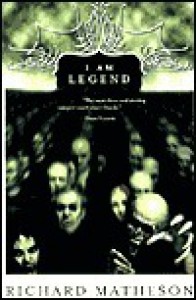
I Am Legend

Reread after good while, yet again I find myself struggling to review a classic.
The sense of isolation and frustration and desperation is quite palpable, particularly in the first section of the book, and I think this is the stronger section than the rather more action packed later parts.
The idea that the last man in the world has access to all the world's knowledge, and all the time in the world to learn it, is something that's been lost from the adaptations, and it struck me here as being a powerful idea. Knowledge is power, but when there's nobody in your way, even an ordinary man can take it - for what it's worth. It does him little good in the long run, but in the short, it improves things very much.
Matheson said if he'd written the book later in life, he'd have put in more philosophy and less sex, but I think that part at least is quite realistic. Both that the vampires use it to tempt him, and that he's frustrated and that it is, even briefly, a temptation to him.
Far better reviewers than I have had a stab at this, so I guess that's all. It's a classic not just because it jump started not one, but two horror genres, but also because it's just a flat out good book. You should read it.
Appending a post that turned into something of an essay, from the GR discussion about this book:
On the other thread, someone posted they found the ending a let down, but I think it's not just perfect, but inevitable. If it had ended in any other way it would have taken a giant deus ex machina to pull off, and been even more unsatisfying. "And then at the last minute he heard the helicopters...." His entire post plague existence rendered trivial and pointless - hasn't the poor man been through enough without piling that on him too?
In a way this is like reading one of those exceedingly rare things: A history written by the loser, because if it had been written by the vampires, we'd be reading about The Legend of Neville, and that wouldn't be half as interesting, for me at least.
I don't think there could be a more positive ending for me. I'd find it a bit "fiddling while Rome burns" to have him romping through the woods with his beloved pupster. I can certainly see the appeal of a somewhat happy (if equally futile, long term) ending though. I'm also not sure that book would still have us arguing about it 60 years later.
I wonder if part of it is the word "Legend" - which has had something of a change in tone since the 50's, it's got sort of a positive connotation now, but it didn't always, and it doesn't here: The book may as well have been titled "I am the Monster".
There's no need from anyone's point of view to be legend, but there is a need to have a legend. Every society ever, has had it's myths, monsters and things that go bump in the night. For us (i.e., Neville), some of those have been victims earlier outbreaks of this disease, that didn't spread so far, and we called them Vampires. Or maybe Zombies, or Ghouls or whatever.
But in this society that's overtaken the old one, the monster is the creature who rode around in the broad sunlight, when the new humans couldn't, and then murdered them as they lay in their beds, and dragged some away to be experimented on. Neville is the boogyeman now, and no matter how it ended, he's always going to be that. That's what he means by "I am legend".
Running away would be way out of character. Neville is a good man, or at least tries to be, that's why he was killing off what he thought were monsters, and it's why he is devastated when he figures out he wasn't.
So, there are clues, he just missed them: the "living" sleeping together, in their own homes as families, just as they always did vs. the "dead" hiding any old where out of instinct is a really big one that I only got for myself when I read it this time around! And he knows he's done a terrible thing, he's at best a war criminal, or more likely a serial killer... either way a monster.
There's no choice on the matter of dying, but he can still choose how, and despite his ruthless killings, he's not an inherently violent man: He killed the vampires as they slept, and when they didn't fight back, and thought he was effectively putting them out of their misery, and he barricaded himself inside at night when they could, preferring to avoid if possible the fighting.
So that's what he and Ruth talk about near the end, why she gives him another option, and why he takes it: If he lets them have their bloody public execution, then her new humanity will be born of blood and violence.











